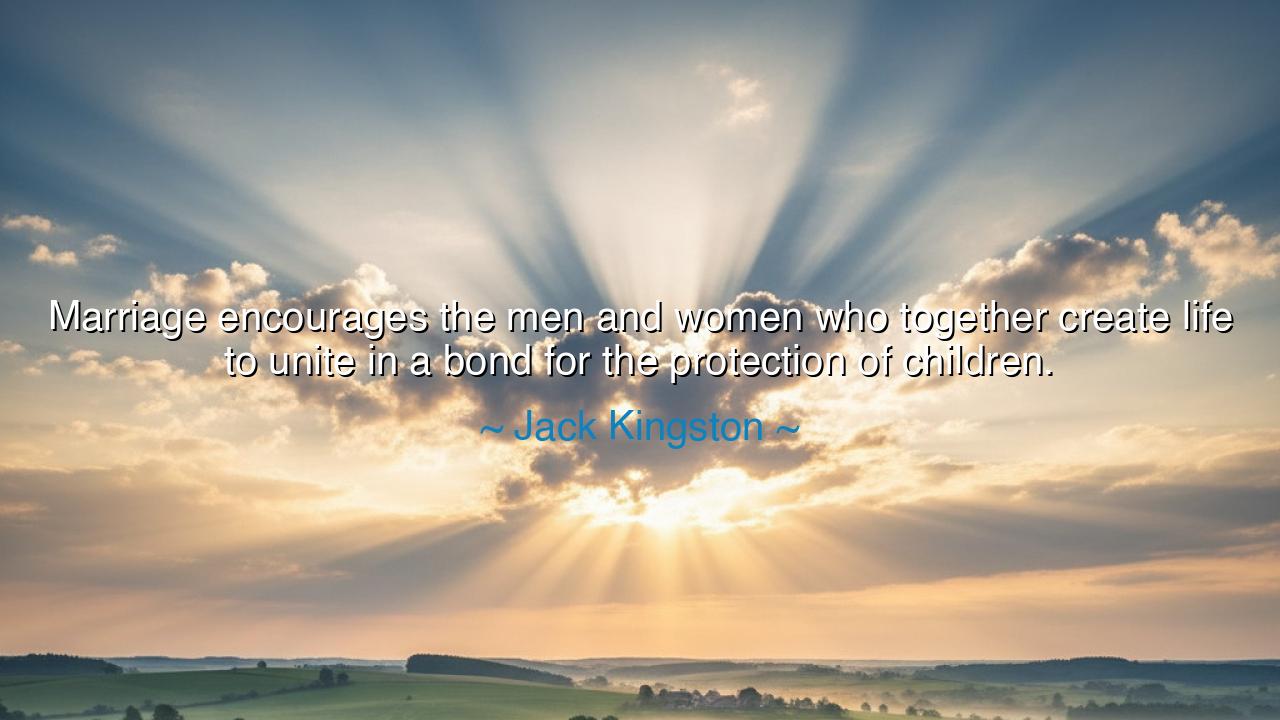
Marriage encourages the men and women who together create life to
Marriage encourages the men and women who together create life to unite in a bond for the protection of children.






In the solemn and reflective words of Jack Kingston, we find a truth both ancient and enduring: “Marriage encourages the men and women who together create life to unite in a bond for the protection of children.” Beneath these simple yet profound words lies the foundation of civilization itself. For since the dawn of humankind, the union of man and woman has not been merely a meeting of hearts, but a covenant that sustains the future. Marriage, in Kingston’s vision, is not only a bond of love—it is a fortress of responsibility, built for the safeguarding of the innocent and the nurturing of generations yet unborn.
The origin of this quote emerges from Kingston’s reflections on the social and moral structure of family life. As a statesman and advocate for traditional values, he spoke often of the need for stability in the lives of children and the community. His words echo the wisdom of societies past—those that understood that the home is the first school of virtue, and the parents its teachers. To Kingston, marriage is not simply a private arrangement between two individuals, but a public trust. It is the cornerstone upon which the future of a nation rests, for it binds love to duty, and freedom to responsibility.
From the most ancient days, the elders of every tribe understood that where there was no bond of loyalty between the creators of life, there could be no lasting peace. The Greeks saw marriage as a sacred act under the watchful gaze of Hera, goddess of family and childbirth. In Rome, the union of husband and wife was honored not for its passion alone, but for its power to produce and protect citizens. Even in the East, in the wisdom of Confucius, we find the belief that social harmony begins in the home—when parents love each other, the children learn respect; when the household stands firm, the empire stands firm. Thus, in every age, wise men and women have understood what Kingston restates for ours: that love, when ordered toward protection and care, becomes the most powerful force in the world.
Consider the life of Marcus Aurelius, the philosopher-emperor of Rome. Though burdened by empire and war, he often wrote of the bond between husband and wife, and of the sacred duty to their children. In his Meditations, he spoke of his gratitude to his own father for living with integrity and compassion. That example shaped him more than any tutor or decree could have. And so it has been in all ages—children flourish where they are shielded by the unity of those who brought them into being. A marriage built on devotion gives to children not wealth or luxury, but the deeper treasures of safety and belonging.
Kingston’s words remind us that marriage is not sustained by emotion alone. It is upheld by choice, sacrifice, and the shared recognition of a higher purpose. Love, in its truest form, demands more than pleasure—it demands perseverance. For in the long journey of life, affection will wax and wane, but the duty to protect and nurture remains unbroken. The bond between man and woman becomes, then, a reflection of divine order: a partnership not of convenience, but of creation. And in protecting their children, parents protect the future itself—the soul of their people, the hope of their land.
Yet, in our modern age, where the idea of permanence often gives way to the pursuit of self, this truth must be remembered anew. To marry is not to bind oneself in chains, but to commit to something greater than the self—to become co-guardians of life’s sacred mystery. When Kingston speaks of the “protection of children,” he speaks not only of physical safety, but of moral and emotional security—the assurance that a child’s heart, fragile as glass, will not be shattered by instability or neglect. The family, united in love and purpose, becomes the world in miniature, the training ground for courage, honesty, and compassion.
The lesson, then, is clear and eternal: love must grow into responsibility, and freedom must mature into stewardship. Those who create life must also protect it—not merely with shelter and food, but with faith, with presence, with enduring unity. Marriage, when rightly lived, is not a prison of obligation but a temple of purpose. Within its walls, both man and woman learn the meaning of selflessness, of giving without counting the cost, of remaining steadfast when storms arise.
Let these words, then, be carried as a torch for all who would build families and nations alike: the strength of a people begins in the strength of its homes. When two who create life unite in devotion, they become more than lovers—they become builders of the eternal. The protection of the child, the nurturing of innocence, the passing on of virtue—all these are acts of heroism that sustain the human story. And so, as Jack Kingston reminds us, the bond of marriage, forged not for pleasure alone but for the protection of life, stands as one of the greatest and most sacred duties of humankind.






AAdministratorAdministrator
Welcome, honored guests. Please leave a comment, we will respond soon